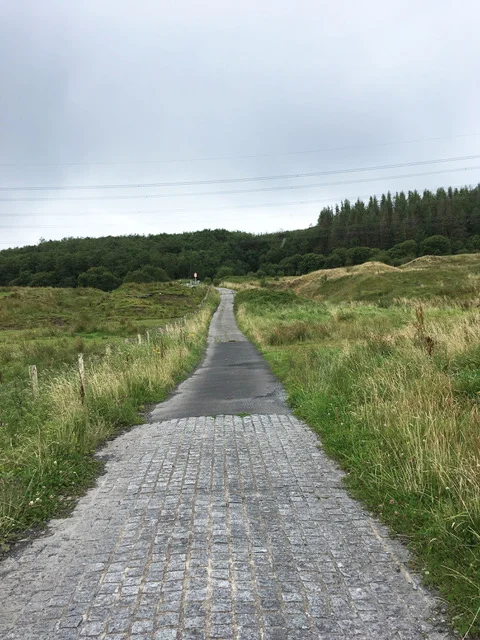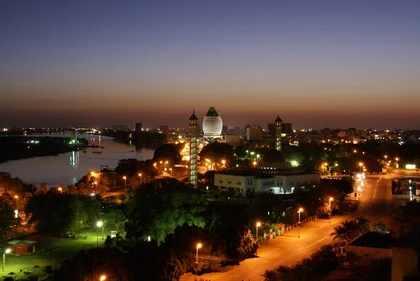Close Call In Kin
by Mike Chambers
Kinshasa, the capital city of the Democratic Republic of the Congo, isn’t a particularly safe town so it is best to keep alert. If you live there for a while you get a feel for what’s safe, and what’s not, depending on what part of town you are in, and the vibe from the street.
One time I was leaving the Grande Marche heading for my house on Avenue Kato just a couple of blocks away. I took a back ally shortcut which was cluttered with stalls that didn’t want to pay the market fees, and shoppers milling about. I hadn’t been shopping, I’d been to a meeting and decided to walk back. I carried my leather rucksack, half full of books and papers, over my left shoulder.
Suddenly I felt a heavy bump from the left and my backpack pulling off my shoulder. I stumbled slightly, banging into a street vendor, then recovered as the shoulder strap from my pack slipped off completely. The papers weren’t that important, mostly copies I could reprint, but the pack itself was a favorite––made from leather from the mythical pygmy cattle of Equateur.
As the strap slipped out of my reach I recovered my balance and lunged. The thief was now a pace away and accelerating his departure. He was dressed in a nondescript, market-friendly manner. Medium height, medium build but his movement was lithe and smooth. I was anything but.
I yelled, squared my shoulders and charged after him.
He deftly turned his eye back to face me, my bag over his left shoulder and his right hand dipping across his body to his left side from where he pulled a bladed knife, more than six inches in length, which he waved in the space between us. It was large but more of a carving knife than a combat weapon.
I put on the breaks, raising my arms, left foot forward with the heal digging in, right foot back to keep me steady. The knife slashed the space between us, with clear intent, passing a good two or three inches from my midsection. The intent was not to injure. The purpose was very clear: I should not follow.
He turned again and accelerated his departure, with my brown leather bag under his arm. He couldn’t have known he was making a mistake, right at the moment when he couldn’t afford it. He was now a running man with a leather ball-like thing under his arm. Rugby! That was a scenario I understood. If I had marked Winterbottom on the ‘81 English tour, I figured I could catch a street thief!
The street was crowded, but I got an angle on him and caught up in a few paces. I grabbed him fairly high on the back of his shoulders where the bag was. He was jolted forward and I had a-hold of the pack. We both went down with me rolling away and up to my feet, bag in hand.
He rolled as well and came to his feet as he redrew his knife. This time we were two paces apart and crouched in the classic wrestlers' pose. My assailant had a real problem. The incident up to this point hadn’t taken more than five or six seconds. But we were in a crowd and it would probably be fair to say that a crowd in Kinshasa has a timer on it. Once time ran out, this crowd would kill a street thief on the spot with no question. Sticks, stones, bricks, and boots would be applied without restraint or remorse.
Thieves were simply not tolerated, especially solo market thieves. Big time connected thieves were a different story but street thieves were stoned on the spot before the police could arrive. Taking a thief to the police gave him time to contact his family to get together money for his release. To the crowd, especially a market crowd, the only answer to thieves was to kill them immediately.
My thief looked straight into my eyes and I looked back, arms extended ready for him to lunge. I had my bag; if he wanted it he still had an advantage but he would have to use his knife. But those few seconds might be costly. His look was straight and steady, knife out front, low centre of gravity, feet apart. My stance was the same, prepared but not attacking.
My body language had been a quickly understood message to my assailant. Two seconds later he stood up, once again lithe but nondescript, sheathed his knife, rotated his shoulders to slip through the crowd and was gone. Disappeared.
I didn’t yell. I didn’t scream. He was gone. I had my bag. I always liked that bag. I still have it.
Mike Chambers recently returned to Canada after 30 years in East and Central Africa. He is now writing full time and fundraising for the Elephant Survival Organization UAV anti poaching surveillance service in Tanzanian parks and reserves. To learn more, visit http://michaelmargravechambers.blogspot.com/





